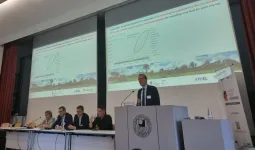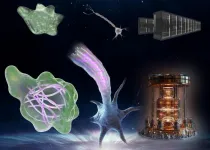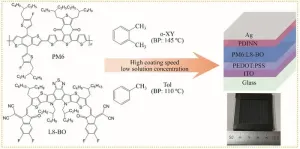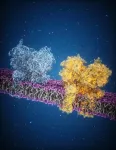(Press-News.org) Fruits and plant extracts contain bioactive compounds that can help treat or prevent diseases. To characterize and understand their mechanism of action, researchers from universities and research institutions in Brazil and Germany have conducted independent but complementary studies.
Some of the results were presented at a lecture session on the future of food and nutrition research on March 25th during FAPESP Week Germany at the Free University of Berlin.
According to Ulrich Dobrindt, a professor at the University of Munich in Germany, medicinal plants contain different types of phytochemicals (natural chemical substances) that neutralize bacterial infections in different ways, thereby boosting the host’s defenses. For this reason, there is growing interest in using extracts from these plants to treat and prevent urinary tract infections, one of the most common infections worldwide, which are currently treated with antibiotics.
“Although their anti-inflammatory, antipyretic and analgesic effects are well known, the active compounds of these plants – such as flavonoids, alkaloids and terpenoids – and their mechanisms of action on pathogen cells have yet to be characterized. Some are antibacterial, but many don’t have this effect,” said the researcher.
In order to further their understanding, German scientists have developed infection models to study the effects of plant extracts on the innate immune response and on the epigenetic regulation of gene expression (biochemical processes that activate and deactivate genes). In bladder cells, for example, they are studying the effect of traditional plants with urological activity, according to the German pharmacopoeia.
In collaboration with researchers at the Federal University of Minas Gerais (UFMG) in Brazil, it was found that some aqueous plant extracts (from species such as Solidago gigantea and Equiseti herba) significantly reduced the adhesion and survival of Escherichia coli in human bladder epithelial cells.
“We observed a drastic reduction in the adhesion and proliferation of this bacterium in bladder cells,” said Ulrich.
Fruit fibers
In Brazil, a group associated with the Food Research Center (FoRC) – one of FAPESP’s Research, Innovation and Dissemination Centers (RIDCs) – has focused on the technological prospection and evaluation of the biological effects on humans of non-digestible water-soluble polysaccharides (bioactive polysaccharides), such as pectins.
Found in papaya, passion fruit and citrus fruits, pectins make up a large portion of the fiber in these fruits and have been linked to a reduction in chronic non-communicable diseases.
However, some of the challenges in extracting these compounds from fruits such as papaya are that they ripen very quickly, resulting in softening of the pulp and chemical modification of the structures of its pectins, which are linked to biological effects such as modulation of the gut microbiota.
“During fruit ripening, enzymes are expressed that modify the structure of the pectins, reducing their beneficial biological effects. Passion fruit and citrus pectins, on the other hand, must be chemically modified in order to present beneficial activities in the intestine,” João Paulo Fabi, professor at the School of Pharmaceutical Sciences of the University of São Paulo (FCF-USP) and coordinator of the project, told Agência FAPESP.
To do this, the Brazilian researchers developed techniques to extract pectin from the albedo of oranges and passion fruit – the white part between the peel and the pulp that is normally discarded when the fruit is processed to make juice – and to modify it in the laboratory to reduce its molecular complexity in order to increase its biological activity.
The development resulted in a patent for the process of extracting pectin from fleshy fruits such as papaya and chayote. A second patent covering the modification of pectin from passion fruit by-products is in the process of being filed.
“We already have a prototype for extracting and modifying these pectins on a laboratory scale. The idea is to obtain a product, such as a flour rich in modified pectin, that could be consumed as a supplement or food ingredient,” said Fabi.
In partnership with other groups, the researchers conducted animal studies to demonstrate the correlation between modified pectins and increased biological activity.
“These preclinical studies can serve as a basis for the development of clinical trials [with modified pectins] as adjuvants to chemotherapy treatment of colon cancer or even as beneficial modulators of the intestinal microbiota,” the researcher said.
More information about FAPESP Week Germany can be found at: fapesp.br/week/2025/germany.
END
Studies evaluate the health effects of bioactive compounds obtained from plants
Researchers from Brazil and Germany study the mechanism of action of phytochemicals from papaya, passion fruit and medicinal plant extracts; results were presented at FAPESP Week Germany.
2025-03-28
ELSE PRESS RELEASES FROM THIS DATE:
Howard University physicist revisits the computational limits of life and Schrödinger’s essential question in the era of quantum computing
2025-03-28
WASHINGTON, DC – (March 28, 2025) More than 80 years ago, Erwin Schrödinger, a theoretical physicist steeped in the philosophy of Schopenhauer and the Upanishads, delivered a series of public lectures at Trinity College, Dublin, which eventually came to be published in 1944 under the title What is Life?
Now, in the 2025 International Year of Quantum Science and Technology, Philip Kurian, a theoretical physicist and founding director of the Quantum Biology Laboratory (QBL) at Howard University in Washington, D.C., has used the laws of quantum mechanics, which Schrödinger postulated, and the QBL’s discovery of cytoskeletal ...
Navigating a US bioscience career despite anticipated cuts in funding for biomedicine
2025-03-28
Many young and midcareer scientists in the U.S. are understandably anxious about potential cuts to government funding and the rise of junk science. Although your future in biomedicine may not be what you originally planned, it might actually become more interesting and filled with new possibilities and opportunities for innovation. Don’t think of this time to hunker down and disappear. Do the opposite with the understanding that you are more powerful and brilliant than you may realize.
In your coverage, please use this URL to provide access to ...
How the failure of two dams amplified the Derna Flood tragedy
2025-03-28
A new study reveals that the devastating 2023 flood in Derna, Libya, was not merely the result of extreme rainfall but was drastically intensified by a major design shortcoming and its resulting collapse of two embankment dams. Through advanced hydrological modeling and satellite data analysis, researchers found that while Storm Daniel brought heavy rainfall, the catastrophe stemmed from dam failures and flawed risk assessment and communication—amplifying the destruction nearly twentyfold. The findings highlight the urgent need for improved flood mitigation strategies, especially in dryland regions where high uncertainty ...
Oral contraceptives and smoking impact steroid hormone levels in healthy adults
2025-03-28
Steroid hormone levels in healthy adults are influenced by oral contraceptives and smoking, as well as other lifestyle choices and factors such as biological sex and age, according to new research that has just been published in leading international journal Science Advances.
The objective of the research was to expand knowledge and understanding of steroid hormone levels, including corticoids and sex hormones, in healthy women and men over a broad age range. This is the first study to analyse such a large number of hormones in nearly 1,000 healthy people, filling a ...
C-Path’s predictive safety testing consortium advances a transformative test to detect drug induced liver injury
2025-03-28
TUCSON, Ariz., March 27, 2025 – Researchers from Critical Path Institute’s® (C-Path) Predictive Safety Testing Consortium have proposed glutamate dehydrogenase (GLDH) as a more liver-specific biomarker for detecting liver injury, supporting clearer decision-making. Currently, alanine aminotransferase and aspartate aminotransferase (ALT and AST) are considered the “gold standard” biomarkers in clinical practice and drug development. However, these biomarkers are not specific to the liver and can reflect changes in other tissues, which may lead to unclear diagnoses, particularly in individuals with muscle conditions ...
Green solvent innovation: high-speed doctor-blading boosts organic solar cell efficiency
2025-03-28
In a recent advancement, researchers have developed a high-speed doctor-blading technique that enhances the efficiency of organic solar cells (OSCs) while using eco-friendly, non-halogenated solvents. This innovative method not only addresses the environmental and scalability challenges of traditional solvents, such as chloroform, but also achieves impressive power conversion efficiencies (PCEs) of 18.20% and 17.36% with green solvents like o-xylene and toluene, respectively. With a module efficiency of 16.07%, this breakthrough sets the stage for more sustainable, ...
C-Path announces successful conclusion of the ECOA: getting better together initiative
2025-03-28
TUCSON, Ariz., March 26, 2025 – Critical Path Institute® (C-Path)Patient-Reported Outcome (PRO) Consortium and Electronic Clinical Outcome Assessment (eCOA) Consortium are pleased to announce the successful conclusion of the eCOA: Getting Better Together Initiative. This initiative, driven by a shared commitment to advancing patient-focused drug development, has culminated in meaningful, lasting changes that will benefit all stakeholders across the eCOA ecosystem.
Beginning in 2019, this C-Path-led collaborative, pre-competitive initiative brought ...
Brain channels ‘stopped in time’ reveal chemical flow that enables learning and thinking
2025-03-28
FOR IMMEDIATE RELEASE
In an effort to understand how brain cells exchange chemical messages, scientists say they have successfully used a highly specialized microscope to capture more precise details of how one of the most common signaling molecules, glutamate, opens a channel and allows a flood of charged particles to enter. The finding, which resulted from a study led by Johns Hopkins Medicine researchers, could advance the development of new drugs that block or open such signaling channels to treat conditions as varied as epilepsy and some intellectual disorders.
A report on the experiments, funded by the National ...
PET imaging confirms direct involvement of dopamine in cognitive flexibility
2025-03-28
Reston, VA (March 16, 2025)—For the first time, scientists have confirmed a neurobiochemical link between dopamine and cognitive flexibility, according to new research published in the March issue of The Journal of Nuclear Medicine. PET imaging shows that the brain increases dopamine production when completing cognitively demanding tasks, and that the more dopamine released, the more efficiently the tasks are completed. Armed with this information, physicians may soon be able to develop more precise treatment strategies for neurological and psychiatric disorders.
Cognitive flexibility is the ability to adapt one’s thinking and behavior appropriately to ...
Understanding the immune response to a persistent pathogen
2025-03-28
Most humans have long-lived infections in various tissues—including in the nervous system—that typically do not result in disease. The microbes associated with these infections enter a latent stage during which they quietly hide in cells, playing the long game to evade capture and ensure their own survival. But a lack of natural models to study these quiescent stages has led to gaps in scientists’ understanding of how latency contributes to pathogen persistence and whether these stages can be targeted by the immune system.
Now, a team led by University of Pennsylvania School of Veterinary Medicine researchers ...
LAST 30 PRESS RELEASES:
New study finds earliest evidence of big land predators hunting plant-eaters
Newer groundwater associated with higher risk of Parkinson’s disease
New study identifies growth hormone receptor as possible target to improve lung cancer treatment
Routine helps children adjust to school, but harsh parenting may undo benefits
IEEE honors Pitt’s Fang Peng with medal in power engineering
SwRI and the NPSS Consortium release new version of NPSS® software with improved functionality
Study identifies molecular cause of taste loss after COVID
Accounting for soil saturation enhances atmospheric river flood warnings
The research that got sick veterans treatment
Study finds that on-demand wage access boosts savings and financial engagement for low-wage workers
Antarctica has lost 10 times the size of Greater Los Angeles in ice over 30 years
Scared of spiders? The real horror story is a world without them
New study moves nanomedicine one step closer to better and safer drug delivery
Illinois team tests the costs, benefits of agrivoltaics across the Midwest
Highly stable self-rectifying memristor arrays: Enabling reliable neuromorphic computing via multi-state regulation
Composite superionic electrolytes for pressure-less solid-state batteries achieved by continuously perpendicularly aligned 2D pathways
Exploring why some people may prefer alcohol over other rewards
How expectations about artificial sweeteners may affect their taste
Ultrasound AI receives FDA De Novo clearance for delivery date AI technology
Amino acid residue-driven nanoparticle targeting of protein cavities beyond size complementarity
New AI algorithm enables scientific monitoring of "blue tears"
Insufficient sleep among US adolescents across behavioral risk groups
Long COVID and recovery among US adults
Trends in poverty and birth outcomes in the US
Heterogeneity of treatment effects of GLP-1 RAs for weight loss in adults
Within-person association between daily screen use and sleep in youth
Low-dose lithium for mild cognitive impairment
Catheter ablation and oral anticoagulation for secondary stroke prevention in atrial fibrillation
A new theory of brain development
Pilot clinical trial suggests low dose lithium may slow verbal memory decline
[Press-News.org] Studies evaluate the health effects of bioactive compounds obtained from plantsResearchers from Brazil and Germany study the mechanism of action of phytochemicals from papaya, passion fruit and medicinal plant extracts; results were presented at FAPESP Week Germany.






